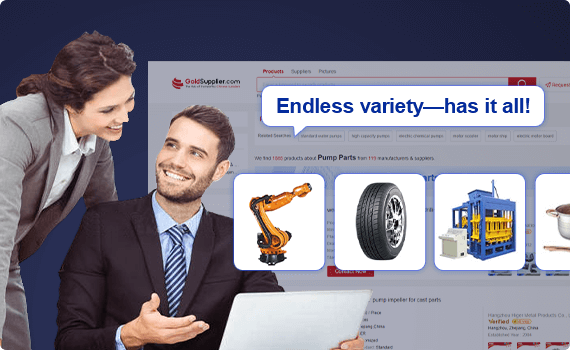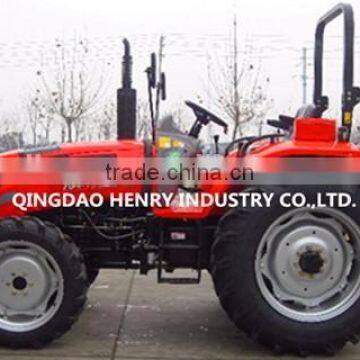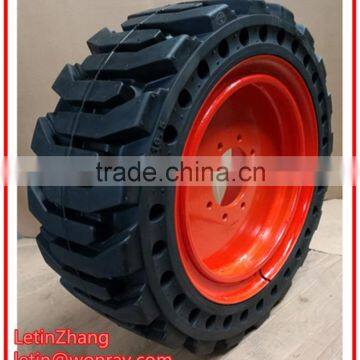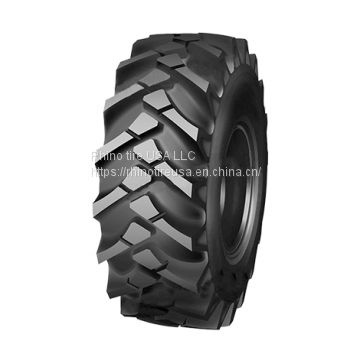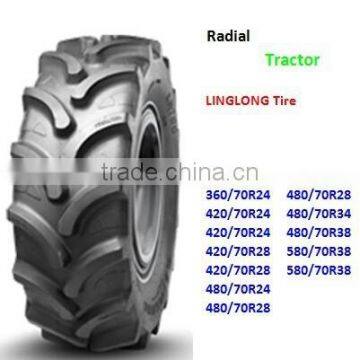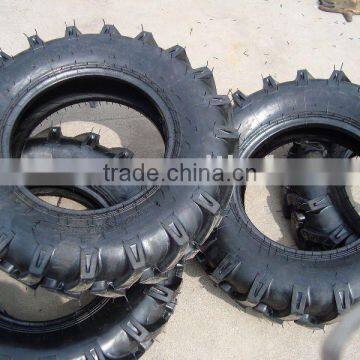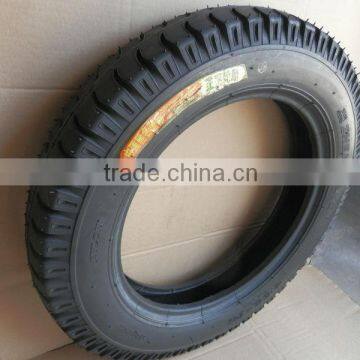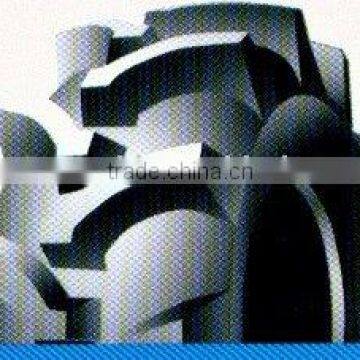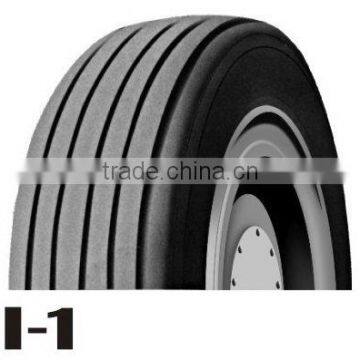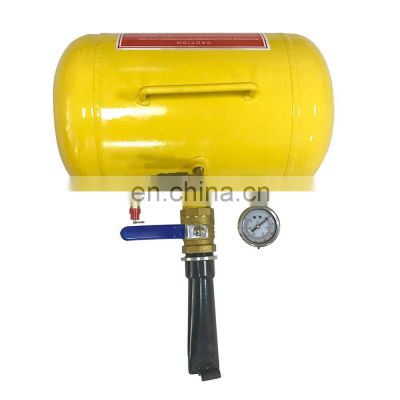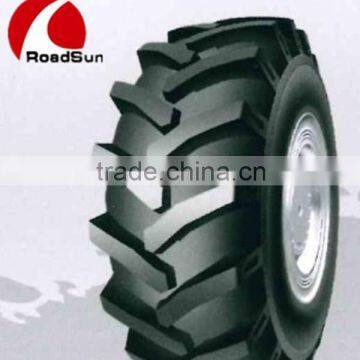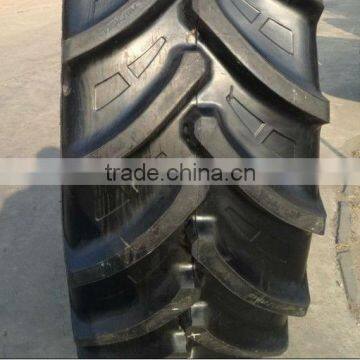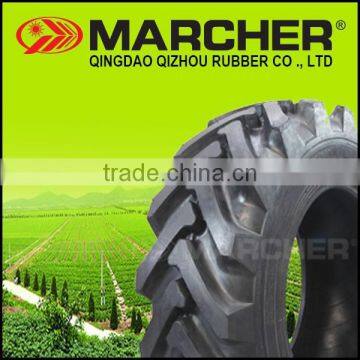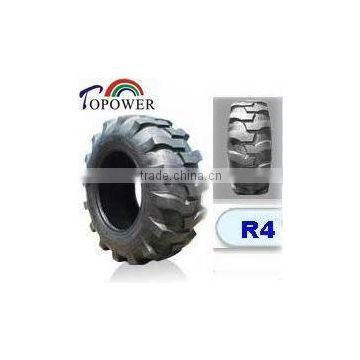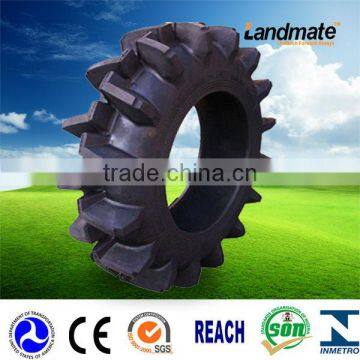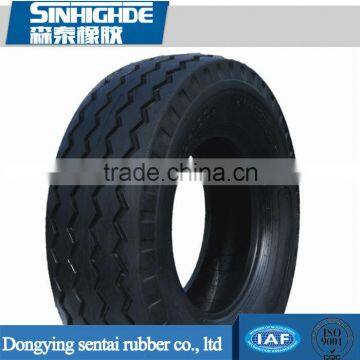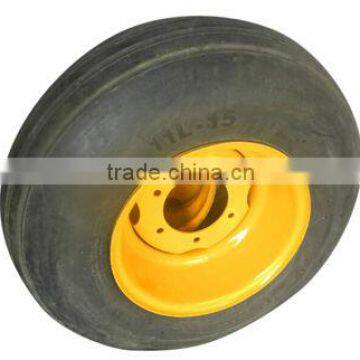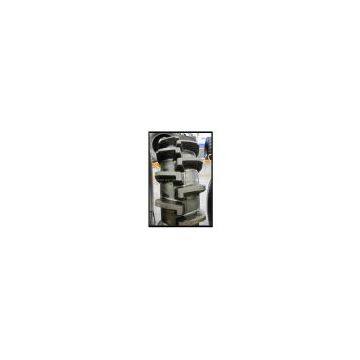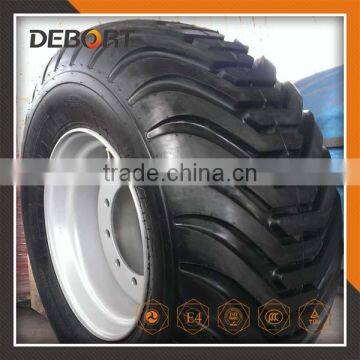farm tire Insights & Buyer's Guide
In agriculture, every single element in your machinery must synergize for overall farm efficiency and productivity. It is farm tires that happen to be one of the most often disregarded yet most relevant parts of current farming systems. In this blog, we take you through the selection of the right farm tires and how they impact soil health, fuel efficiency, and general equipment performance. So join us as we investigate the varieties of farm tires out there, their defining features, and how to select the right ones for your farming needs. It's probably helpful for you as a farmer, whether already successful or just starting, to understand the importance of farm tires to ensure better agricultural planning and the eventual success of your farm.
Understanding the Significance of Farm Tires
How Tire Choices Affect Efficiency on the Farm
The farm tire choice has a crucial implication on the efficiency of farm processes. Suitable tires may also enhance the working conditions of farm machinery such as tractors, sprayers, and planters through optimum traction and reduced soil compaction. Radial tires, for example, stand to gain superior traction and are generally preferred because of the ability to reduce soil compaction in comparison with bias tires. Such reduced compaction is a key factor in keeping the soil healthy, which in turn enhances crop yields. The choice of turf tread and tire pressures may also vary depending on load and flotation considerations that affect productivity. Hence, when evaluating options from reputed tire manufacturers such as Firestone, Goodyear, Michelin, and Titan, the selection of the tires must be made considering the specific needs of the farm, either for heavy-duty work or negotiating heavy terrain. Talking to tire experts and salesmen could lead to useful information about tires for sale that will propel your farm into real production.
How Traction Affects Agricultural Productivity
Traction is an immediate factor affecting agricultural productivity. The ability of a tire to maintain a firm grip on the ground determines how good farm equipment will perform in activities such as plowing, planting, and harvesting. A tractor tire running in high traction will reduce slippage of all equipment and thus direct saving of fuel and time precious commodity to the farmer. The radial ones, therefore, provide the best traction in a myriad of soil conditions. To maintain optimum traction levels, the use of technology such as PTG Central Tire Inflation Systems (CTIS), which permits changes in tire pressure state-of-the-art, can be maintained depending on terrain changes. This ensures that the farm equipment is working and highly productive. Further selection of agricultural tires should consider the needs of the equipment and the soil profile to enable them to perform their functions optimally-whether in muddy, sandy, or rocky terrain. Having the right set of tires is just the beginning of maximizing agricultural productivity.
Understanding Compaction and Its Consequences
Compaction of soil is a major problem in modern agriculture, as it affects soil structure, water infiltration, and root growth. The farm tire selection is important for dealing with the compaction issue effectively. Radial tires reduce soil compaction more effectively by offering a more even weight distribution than bias tires. It is therefore very important for the life of good soil to reduce compaction for sustainable agriculture. The tread design and the size of the tire are other important variables affecting the tire-to-ground contact area. The flotation tires may further reduce soil compaction if they offer a large contact surface area to support the weight of the machinery. Farmers who are trying to keep the terrain good for farming need to understand compaction and the function that best tire selection plays. Working with tire experts and incorporating the latest tire technology will enable the farmers to manage compaction better, thus increasing crop yields and enhancing the sustainability of the farm.
Types of Farm Tires Available
Overview of Agricultural Tire Varieties
The very selections of farm tires determine how well the agricultural activities can be performed and how productively they can work. In simple terms, farm tires can be classified into several types according to the different uses required by various agricultural needs. Some of the common types of farm tires include the following:
Radial tires: These tires are favored for their excellent traction and reduced compaction of the soil, thus making them suitable for all kinds of heavy-duty and general farm tasks.
Bias tires: They are of strong construction and are used under conditions that demand a lot of durability.
Flotation tires: These make for a large contact patch to avoid disturbing the soil and are used for wet or soft soil conditions.
Implement tires: Specifically fit for towed equipment such as balers and seeders, hence stabilizing them and decreasing rolling resistances.
Farmers must become acquainted with the advantages of each type of farm tire so as to select an option that would best complement the operational and efficient activity of their farm equipment. Consulting tire experts and keeping up to date with technological advancements helps greatly in the decision-making process to choose the best tires for a specific agricultural requirement.
Tractor Tires: Selection and Specifications
Tractor tires are fundamental components of farm equipment and play a role in the efficiency and efficacy of farming operations. Various factors must be considered while selecting tractor tires, concerning their compatibility with the equipment itself and the farming landscape. Some of these factors include:
Tire size: It is a very important factor as it determines load capacity and maneuverability across off-road terrains.
Tread design: It determines traction and how the tire interacts with different terrains; deep treads provide higher traction, particularly in adverse terrains, while a tread with maximum life would cost the least in the long term.
Rear tires are designed to carry almost all the load; thus, they must be selected according to ply rating to carry the maximum load most efficiently. Tire manufacturers like Firestone, Goodyear, Michelin, and Titan sell tractor tires that cater to all kinds of farming requirements. The advice of a sales staff and an expert in tires will help farmers pick the right tire that suits their operational requirements and aid them in moving their farm forward.
Specialized Tires for Planters and Sprayers
Planters and sprayers within farming are critical implements that especially require specific kinds of tires to meet their performance demands. These specialized planter and sprayer tires are engineered to support the precise operations with minimal disturbances to the soil. For planters, tires should be capable of holding alignment and depth accuracy during planting with their aggressive tread pattern and tire pressure. The sprayers usually move about on landscapes that might be soft and uneven at times, and here, flotation tires help distribute weight evenly and thus lessen soil compaction while enhancing maneuverability. The PTG Central Tire Inflation System (CTIS) is a modern feature that allows adjusting the tire pressure on the move to maintain stability and traction of the sprayers through changing terrains. VF (Very High Flexion) tires are another evolutionary innovation for sprayers, enabling a higher degree of flexibility and load capacity without compromise to tire life. Through purchasing the proper tires and utilizing the latest technology, farmers can guarantee greater efficiency and accuracy during planting and spraying, thus contributing to better crop yields and making the farm more sustainable.
Choosing the Right Tire for Your Equipment
Factors to Consider: Soil Types and Terrain
Choosing perfect farm tires for agricultural equipment hinges on knowing the soil types and terrain. These conditions require certain configurations in tires to ensure top performance while minimizing soil compaction. For example, in sandy or loose soils, flotation tires, which have a larger contact area, are preferable to avoid sinking and help with traction. However, on rocky or hard terrains, tires need to have strong tread patterns and a high ply rating to withstand harsh conditions without getting damaged. The terrain under consideration may possess variation, and such variation dictates the need for good maneuverability and stability of farm tires. By consulting tire experts and using devices like the PTG Central Tire Inflation System, farmers can alter tire pressures according to various conditions so that their equipment, in turn, maintains a high level of efficiency and usefulness. In the end, an in-depth understanding of how tires work against the terrain is very much needed to give a boost to your farm and keep away from continuous agri-productivity issues.
Weather Conditions and Their Impact on Tire Selection for Farm Equipment
Weather conditions directly impact the choices of tires for farm equipment. Such physical factors as rainfall, temperature, and seasonal changes have also been held responsible for affecting the performance of tires in agricultural sectors. In wet conditions, when the chances of soil compaction are higher, radial tires with other advantages of traction and flotation should be used to lessen disturbance to the top soil and improve operational efficiency. Meanwhile, during dry and hot conditions, tires must sustain the impact of high temperatures and provide adequate load capacity without compromising tread life. In such an environment, interest may lie in VF tires that offer more flexibility in carrying a heavier load at low tire pressure. Improving the adaptation of tires to seasonal variation, whether it requires a change of tire pressure or replacement in a given season, is crucial. Informed farmers can choose and support their equipment with the best tires that assure farmer operations' resilience and productivity in ever-changing weather circumstances.
Matching Tires to Different Farm Equipment
The range of farm equipment is varied; therefore, the tires must be selected accordingly to ensure the best compatibility and performance. Tractor tires must be selected about the maximum loads to be imposed and traction over various terrains. Rear tractor tires require a higher ply rating to cope with the weight distribution. For planters and sprayers, flotation or advanced tread pattern tires must be utilized to maintain the level of stability during operations. Implement tires for towed equipment, like balers and seeders have reduced rolling resistance and increased maneuverability. In addition to the size of the tire, the tread pattern greatly affects the efficiency and effectiveness of the equipment. Tire brands such as Firestone, Goodyear, Michelin, and Titan make tires that fulfill specific farming needs. To find suitable tires to pair with each piece of equipment, farmers will turn to sales staff and experts. This, in turn, will make the farming enterprise efficient and productive.
Frequently Asked Questions (FAQs)
What are the advantages of agricultural tires for farm equipment?
Agricultural tires give better traction and efficiency to farm equipment. Their heavy-duty rubber compound makes the tires durable while ensuring minimum soil compaction. Using the correct kind of tires for your farm equipment increases the production and performance of the equipment, thereby providing a better grip and maneuverability for different agricultural operations. Furthermore, these tires usually have longer tread life and thus, they are more profitable in the long run. If are looking for any tires for sale, feel free to stop by our shop to check out the large selection of tractor tires that we carry.
How do I select the right tractor tires?
When trying to select the right tractor tires, you want to consider the agricultural applications in which you are involved, the kind of terrain you work on, and the specifications of your tractor. Tires come in radial or bias constructions, and selecting the right one will enhance your tractor's performance. You might want to consider tires that add extra traction and efficiency if you have a high-horsepower tractor, and there are other factors, such as overall diameter of tires and tire configuration, that should be considered for other situations. If you are still in doubt, please contact us for expert advice unique to your farming operation.
Is it important to maintain the right pressure in agricultural tires?
Farmers should try to maintain the right pressure in their tires so they may remain safe and perform optimally. Pressure variations cause irregular wear, setbacks in traction, and an increase in fuel consumption. From time to time, you should check the air pressure to ascertain whether the tires are operating at their optimum performance. For instance, if the tires are under-inflated, they may develop flexing, which would compromise their integrity. When judging your tire pressure concerning your tires, it would be best to seek help from our tire store or refer to the manufacturer's manual.
When should I change my farm tires?
The answer depends on how much use and wear the tires have seen and the environment to which they are subjected. In most cases, your next set of tires should be fitted when your existing tires show considerable signs of wear or damage. Regular tire checks will help detect errors early enough so you can exchange or replace the tires before the mistake becomes critical. Moreover, if they do not give you enough traction or efficiency anymore, it is time to consider buying new tyres. You may always come down to the shop and get a wide selection of quality tyres that will give you the best performance.
Will floaters or duals work for me in enhancing tractor performance?
Floaters or duals can immensely improve tractor performance, particularly under soft soil conditions. Floater tires bestow additional flotation that aids in distributing the tractor's weight over a broader area, thus lessening soil compaction. Dual tires also enhance traction and stability, which makes them suitable for heavy applications. While weighing these options, ponder on the agricultural applications that you will be doing and consult on any doubts. Feel free to reach out to us for more information on the best tire setup for your tractor.
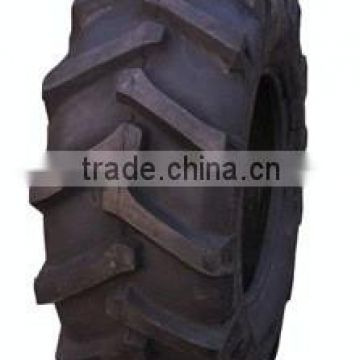 forestry tire farm tireUS$ 380 - 1,500MOQ: 1 PieceWeihai Datong Electromechanical Co., Ltd.5 YRS
forestry tire farm tireUS$ 380 - 1,500MOQ: 1 PieceWeihai Datong Electromechanical Co., Ltd.5 YRS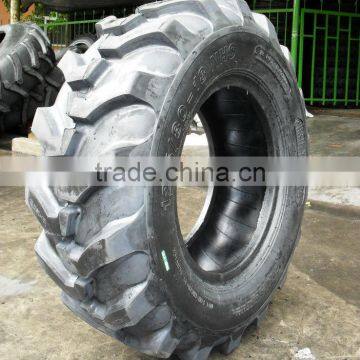 farm tire Agricultural Tractor Tires 7.50-16 14.9-24 12.4-28US$ 19.9 - 68,550MOQ: 20 SetsComar Tyre & Rubber Industrial Co., Ltd.5 YRS
farm tire Agricultural Tractor Tires 7.50-16 14.9-24 12.4-28US$ 19.9 - 68,550MOQ: 20 SetsComar Tyre & Rubber Industrial Co., Ltd.5 YRS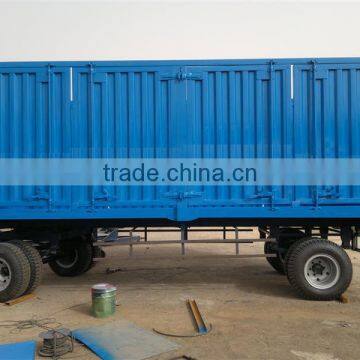 farm tractor trailer tires for wholesalesUS$ 500 - 8,000MOQ: 1 SetYucheng Dadi Machinery Co., Ltd.5 YRS
farm tractor trailer tires for wholesalesUS$ 500 - 8,000MOQ: 1 SetYucheng Dadi Machinery Co., Ltd.5 YRS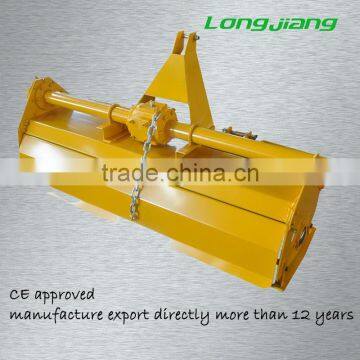 farm implement tire 4.00-8US$ 500 - 800MOQ: 5 SetsYancheng Dafeng Longjiang Machinery Factory5 YRS
farm implement tire 4.00-8US$ 500 - 800MOQ: 5 SetsYancheng Dafeng Longjiang Machinery Factory5 YRS SJH 140hp mini farm tractor 16.9-38 tires farm tractorUS$ 20,000 - 24,000MOQ: 1 UnitLuoyang Shiying Machinery Production Co., Ltd.5 YRS
SJH 140hp mini farm tractor 16.9-38 tires farm tractorUS$ 20,000 - 24,000MOQ: 1 UnitLuoyang Shiying Machinery Production Co., Ltd.5 YRS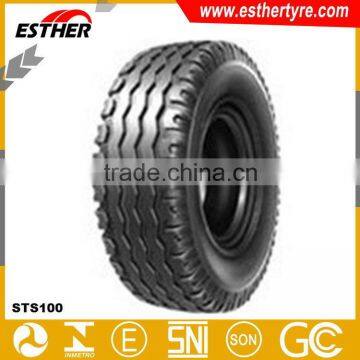 china hot selling farm radial agricultural tireUS$ 10 - 100MOQ: 1Qingdao Kingsway Tire Co., Limited5 YRS
china hot selling farm radial agricultural tireUS$ 10 - 100MOQ: 1Qingdao Kingsway Tire Co., Limited5 YRS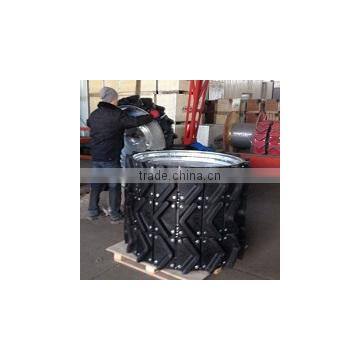 Plastic tire of Farm Sprinkler Irrigation SystemUS$ 1 - 350MOQ: 1 PieceRainfine (Dalian) Irrigation Co., Ltd.5 YRS
Plastic tire of Farm Sprinkler Irrigation SystemUS$ 1 - 350MOQ: 1 PieceRainfine (Dalian) Irrigation Co., Ltd.5 YRS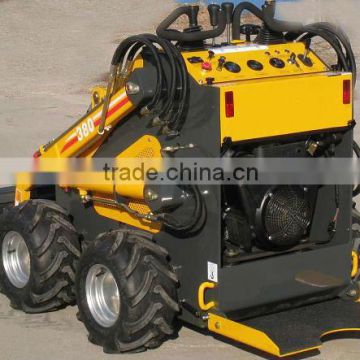 mini shovel loader with tires or crawler for farmNegotiableMOQ: 1 SetTaian Modern Heavy Industries Technology Co., Ltd.5 YRS
mini shovel loader with tires or crawler for farmNegotiableMOQ: 1 SetTaian Modern Heavy Industries Technology Co., Ltd.5 YRS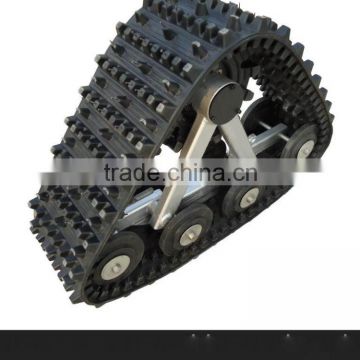 Triangle rubber tracks farm tractors in stock for sale,triangle tireUS$ 200 - 1,200MOQ: 1 PieceShanghai Kymoon Rubber Co., Ltd.5 YRS
Triangle rubber tracks farm tractors in stock for sale,triangle tireUS$ 200 - 1,200MOQ: 1 PieceShanghai Kymoon Rubber Co., Ltd.5 YRS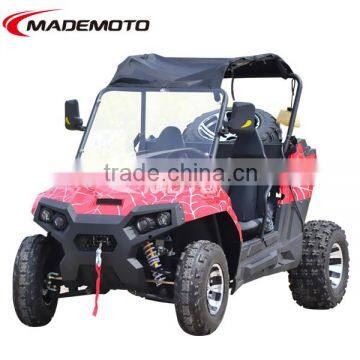 china utv for sale tires utv utv 200 cc utv 4x4 farmUS$ 1,400 - 1,800MOQ: 1 PieceWuyi Wiztem Motion Apparatus Company Limited5 YRS
china utv for sale tires utv utv 200 cc utv 4x4 farmUS$ 1,400 - 1,800MOQ: 1 PieceWuyi Wiztem Motion Apparatus Company Limited5 YRS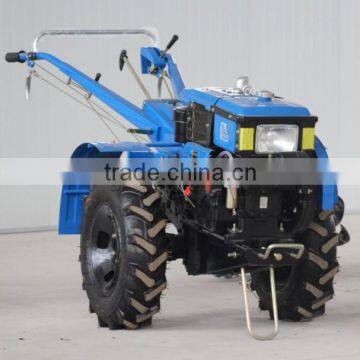 10hp farm tractor with farm tiresUS$ 580 - 880MOQ: 1 SetShandong Luwei Agriculture Equipment Co., Ltd.
10hp farm tractor with farm tiresUS$ 580 - 880MOQ: 1 SetShandong Luwei Agriculture Equipment Co., Ltd.
